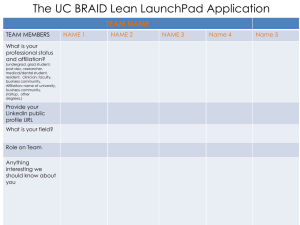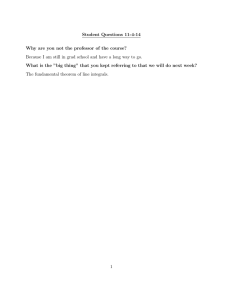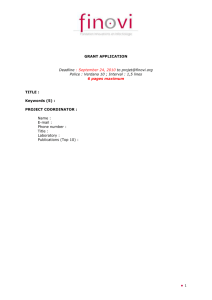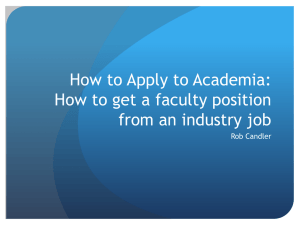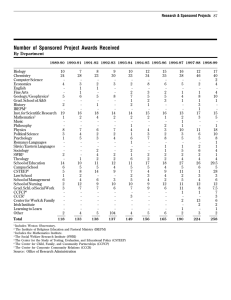Some thoughts on recruitment and mentoring of grad students and... My credibility or lack thereof: Gary Roberts, Bacteriology
advertisement
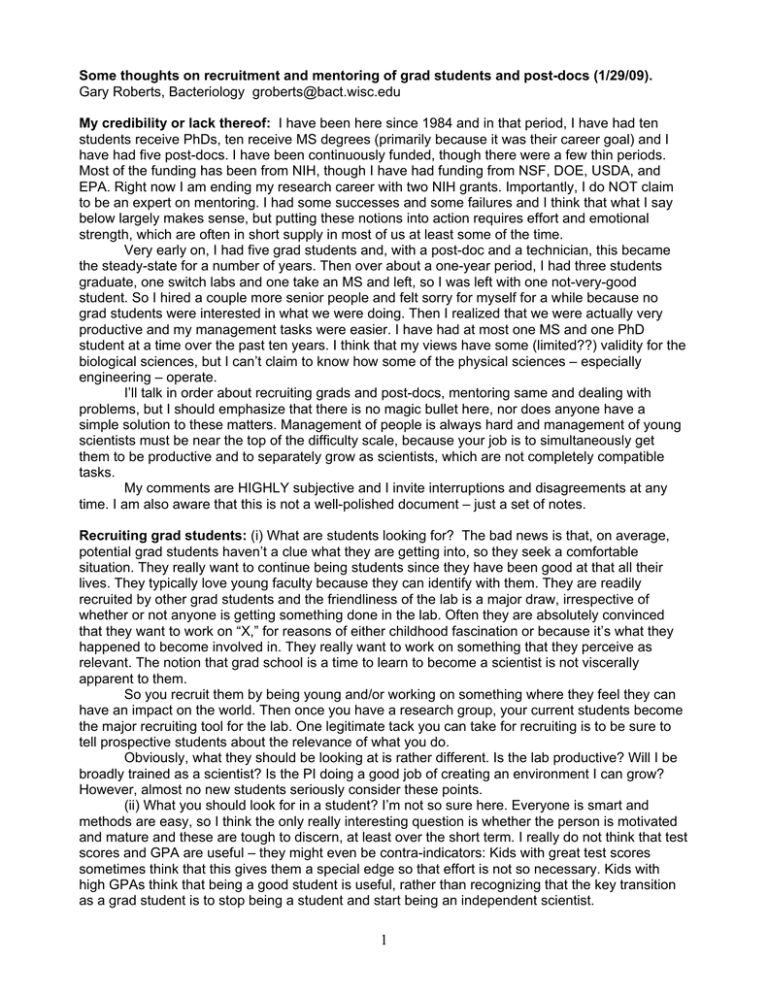
Some thoughts on recruitment and mentoring of grad students and post-docs (1/29/09). Gary Roberts, Bacteriology groberts@bact.wisc.edu My credibility or lack thereof: I have been here since 1984 and in that period, I have had ten students receive PhDs, ten receive MS degrees (primarily because it was their career goal) and I have had five post-docs. I have been continuously funded, though there were a few thin periods. Most of the funding has been from NIH, though I have had funding from NSF, DOE, USDA, and EPA. Right now I am ending my research career with two NIH grants. Importantly, I do NOT claim to be an expert on mentoring. I had some successes and some failures and I think that what I say below largely makes sense, but putting these notions into action requires effort and emotional strength, which are often in short supply in most of us at least some of the time. Very early on, I had five grad students and, with a post-doc and a technician, this became the steady-state for a number of years. Then over about a one-year period, I had three students graduate, one switch labs and one take an MS and left, so I was left with one not-very-good student. So I hired a couple more senior people and felt sorry for myself for a while because no grad students were interested in what we were doing. Then I realized that we were actually very productive and my management tasks were easier. I have had at most one MS and one PhD student at a time over the past ten years. I think that my views have some (limited??) validity for the biological sciences, but I can’t claim to know how some of the physical sciences – especially engineering – operate. I’ll talk in order about recruiting grads and post-docs, mentoring same and dealing with problems, but I should emphasize that there is no magic bullet here, nor does anyone have a simple solution to these matters. Management of people is always hard and management of young scientists must be near the top of the difficulty scale, because your job is to simultaneously get them to be productive and to separately grow as scientists, which are not completely compatible tasks. My comments are HIGHLY subjective and I invite interruptions and disagreements at any time. I am also aware that this is not a well-polished document – just a set of notes. Recruiting grad students: (i) What are students looking for? The bad news is that, on average, potential grad students haven’t a clue what they are getting into, so they seek a comfortable situation. They really want to continue being students since they have been good at that all their lives. They typically love young faculty because they can identify with them. They are readily recruited by other grad students and the friendliness of the lab is a major draw, irrespective of whether or not anyone is getting something done in the lab. Often they are absolutely convinced that they want to work on “X,” for reasons of either childhood fascination or because it’s what they happened to become involved in. They really want to work on something that they perceive as relevant. The notion that grad school is a time to learn to become a scientist is not viscerally apparent to them. So you recruit them by being young and/or working on something where they feel they can have an impact on the world. Then once you have a research group, your current students become the major recruiting tool for the lab. One legitimate tack you can take for recruiting is to be sure to tell prospective students about the relevance of what you do. Obviously, what they should be looking at is rather different. Is the lab productive? Will I be broadly trained as a scientist? Is the PI doing a good job of creating an environment I can grow? However, almost no new students seriously consider these points. (ii) What you should look for in a student? I’m not so sure here. Everyone is smart and methods are easy, so I think the only really interesting question is whether the person is motivated and mature and these are tough to discern, at least over the short term. I really do not think that test scores and GPA are useful – they might even be contra-indicators: Kids with great test scores sometimes think that this gives them a special edge so that effort is not so necessary. Kids with high GPAs think that being a good student is useful, rather than recognizing that the key transition as a grad student is to stop being a student and start being an independent scientist. 1 I confess to having so insights for judging motivation, but maturity is always valuable. I would therefore give bonus points for any student who has done something – ANYTHING – for a 1-3 years, because they are likely choosing grad school because they have decided that they want a particular result, rather than because it was the path of least resistance. Recruiting post-docs: You want a post-doc who will come in and get something done for you and then will be able to go out and land their next position without becoming a fiscal and emotional albatross around your neck. It is also nice if they can get their own money. But the key things for external funding – at least from NIH – are that it be a good training potential and that the student is perceived as being excellent. “Training potential” refers in part to the fact that you should provide them with a place to learn fundamentally new topics and approaches. This implies that there will necessarily something of a learning curve for the post-doc. So there is a tension between having someone hit the ground running versus adjusting to the very different environment implied by a lab with good training potential. Training potential also refers to having a plan to help the post-doc grow as a scientist for the next position. Again, I think the absolutely key property is motivation, but how do you tell that in recruiting? Certainly 3-4 publications is a good start because it means they have got something out the door and it also means that this will be taken as good evidence that they are an excellent candidate for a post-doc fellowship (assuming strong training potential of your lab). However, some people with a number of publications have simply been in the right place at the right time and others with very few pubs have been in the wrong place. So I would certainly consider an apparently unproductive grad student application if the mentor makes it clear that the student has figured out how to be a scientist, and if true, then they come in having something to prove. The bad news is that you can be sure that your funding will have to carry such previous under-performers, so they had better work out. With post-docs, young faculty members have a couple of challenges: they are not so widely known and therefore will typically not get strong applicants, and secondly there will be a prejudice on some grant panels against funding post-docs in the labs of junior faculty (more on this below). The other wrinkle is that a post-doc has a de facto large “social” impact on a lab, so a poor post-doc causes the additional problem that he/she provides a poor role model. I think this might be especially true in a young person’s lab, when you don’t have perceived “age and experience” on your side. Mentoring grad students. The tension here is that a student needs to grow as an independent scientist, which means that to some extent they need to be on their own. They need to take responsibility for making decisions and for getting things done. They need to see that taking a day off when you are out of town means that they will get less done and not (just) that you will be irritated with them. They need to stop working for a pat on the head from their major professor – the driving force behind even good undergrads – and start working because they care about the result and they see solving it as their responsibility. However, part of moving in this direction means that they are making their own mistakes, which means they aren’t getting things done, which means you aren’t getting data for you next paper or grant. So there is enormous pressure to lean on students and organize their lives for them, so the lab gets results, but I am not sure how much a student grows in this situation. Another general challenge is that starting grad students have largely been trained to be students and you need to convince them that they need to abandon the skill set that has been the basis for their success and self esteem and to launch into a new area, research, where they don’t necessarily have the tools and there is a new and scary responsibility. Some students have crummy hands, most don’t keep good notes, few know how to set up experiments and virtually none know how to organize experiments to end up with a publishable story. Many cannot write English well at a local level, but none knows how to tell a scientific story for publication. Then there is generally no urgency among starting grad students, since “5 years to get a degree” means “forever” in the brain of a reasonable 21-year-old. Lastly, this is a period of their lives when they are only just coming to 2 grips with who they are as an independent people, much less as scientists. So they have a bunch of other challenges running in the background. Not surprisingly, faculty members think about student issues through the prism of their own experience. This makes sense, but there are two problems here. It really is not fair to expect every new grad student to be like you were. After all, you are by definition awfully damned good at this game, so that’s not quite a fair bar to hold someone else to. A student can do less well than you did and still be a completely terrific addition to a lab. The other little problem is that we all misremember the challenges that we struggled with and how hard we worked (John Suttie, a long-time professor in Biochemistry used to say “We all remember the time we stayed until 3 in the morning.”). We forget that we too did some dumb things, were confused, lacked confidence, were sometimes lazy etc etc. Unfortunately, I have no real solution, because every student and every lab is different, but here are some thoughts. (i) You do need to treat every student a bit differently, based on where they are in the process, but you can’t allow the perception to be that you are playing favorites. (ii) Students over-interpret our actions. They recognize that their mentors know a lot of science and they subconsciously assume that we know what we are doing as mentors. So they often interpret small comments and minor actions as deliberate signals from the mentor even when they are not. (“My major prof doesn’t think I’m any good because she forgot that it was my turn to give the lab meeting presentation!”) (iii) Conversely, students under-interpret many of our direct statements. Telling students that they need to “do better in terms of X” is often taken as a suggestion that can readily be ignored. (iv) You certainly need to treat them differently over time as they mature as scientists. It might make sense to meet with each student individually every week for the first year and then give them more space – fewer direct meetings – as they mature, or in some other way give them a signal that they need to take more responsibility and that you have confidence in them. I actually have only two specific bits of advice. The first is to use the student’s committee to help both you and the student. When I say that students don’t listen well to direct comments from you (point iii above), they typically listen well to the committee. (An anecdote – I told a student of mine for months that she had to focus, without apparent effect. Then she went and talked to a member of her committee, a formidable female faculty member in another department, and when she came back, her eyes were literally wide open and she said (without any irony) “xxx says I need to focus!” Sometimes committees help by sending an appropriate signal to the student and sometimes by telling you and the student that you both need to stop heading down a certain path because it’s not working. So don’t fight the committees, do talk to your committee colleagues about what to do in order to bring the student along, and be sure to have regular meetings with the committee. Don’t let the student – or yourself – put these meetings off. The second bit of advice is on the apparently infinite time-frame to degree (from a new grad student’s perspective). I note that in Europe, they often tell the student that he/she has 3.0 years to get things done. This is a time-frame that the kids can viscerally appreciate and they immediately see some urgency, but we lack that here. I don’t have smart ideas on this, but I might suggest that one can create useful time goals for students based around a paper. The issue is that students have typically never written a paper, or at least have never had to take intellectual control over the process, so that too appears to stretch forever in the future. Might I suggest that as a publishable idea starts to form, you talk to the student and have them start writing “the bold section titles for the Results section” and what experiments are needed for each. This helps everyone focus on the story to be told and is also highly educational as things change and the story is modified. Note that changes in the plan in response to new results do not disqualify the story, but merely mean that the organization and theme need to be reconsidered. Nevertheless, it provides a focus for the work and encourages the student to start building the scientific arguments for the sections and see how these fit together in a coherent scientific story. As an aside, if there are other people involved in the work, either in your lab or in those of collaborators, it is very helpful to have everyone tentatively agree to the author list, so that one doesn’t have two people both expecting to be first author etc. This allows everyone to buy into the work as appropriate to their reward and provides the student a goal with a reasonable time horizon. 3 Mentoring post-docs. I think the problem is simpler here, because they really should be more mature and you and the post-doc should be able to agree that they need to grow in independence. But the challenge is that the time-frame is shorter, so one is less able to blow a year “trying something.” The other challenge is that you should spend a fair amount of time helping the person prepare for their next job, whatever that might be. I noted above that some grant panels (for postdoc fellowships) are loathe to support post-docs in the lab of the junior person, so I have a suggestion that will help those post-doc proposals, as well as being a good idea in any event. In consultation with the post-doc, choose a couple faculty colleagues who would be good members of a mentoring committee. It might be best if you then contact these people to explain the game, but the role of this committee is not so much to grapple with the science, as to talk about the skills and background necessary for the post-doc’s preferred next job. If industry is the goal, then get a couple colleagues who have been there etc. Then schedule meetings semi-annually and have the post-doc talk about what he/she is doing to enhance their career. This will be good for the post-doc and such formalization of mentoring (by naming the mentor committee) goes some distance to addressing the “junior faculty” concern of grant panels. Dealing with unsuccessful grad students. This is tricky because almost no student has the game figured out when they start, so in taking a student, you are betting that they will figure it out (that is, take responsibility emotionally for their project). Some students who go on to productive careers don’t really get this done until their third year, in part because they are being distracted by prelims and courses and TAing – most of which are more comfortable for them than taking responsibility for the project. So it is typically a bad idea to throw up your hands in despair in the first year. However, you really, really do not want to have a student in their fifth year who still hasn’t figured it out. That probably means they never will, so then you have the problem of terminating them (with a five-year MS) or spending even longer on someone who will never really behave like a PhD scientist. My point is that the time window for a reasonable analysis is surprisingly short: years 2-3. About all I can suggest for students who are struggling in their second year is that you start creating some very clear goals (“do X in six months”) so that you (and the student) will have pretty good data about how he/she is proceeding in time for the third year/ prelim. Student problems are highly appropriate issues to talk about with the other committee members, either in the committee meetings (with the student out of the room) or in private meetings at other times. Remember that letting a student who isn’t maturing hang around for along time does not provide a happy ending for anyone. Dealing with unsuccessful post-docs. Here it is simpler, though not easier, than with grad students. Give the post-doc time to warm up and then start meeting to jointly develop clear goals and targets. If they repeatedly don’t get these accomplished, then you have a fairly clear basis for discussing the problem with them and for explaining why he/she needs to go elsewhere. The other advantage with post-docs is that you can identify a clear deadline for the end of funding before he/she arrives and so it will be clear that there is a date after which it is the post-doc’s problem. 4
